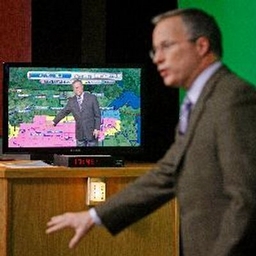
John Wheeler
Meteorologist at WDAY-TV (Fargo, ND)
Meteorologist at WDAZ-TV (Grand Forks, ND)
Meteorologist with WDAY-TV, WDAZ-TV, The Forum since 1985. B.S. in Meteorology Iowa State University. Opinions are just mine.
Articles
-
3 weeks ago |
inforum.com | John Wheeler
"When you know, you know," is a phrase I have used the past few weeks when talking about the timing of my retirement. Recently, there has been a change in the things that matter the most to me. The softness of the bathroom mat under my bare feet in the morning has become more important than the daily outlook from the Storm Prediction Center. It has become harder to drag myself away from the birdsong in the backyard to get dressed for work.
-
3 weeks ago |
inforum.com | John Wheeler
FARGO — During the fall of 2007, 10 years after the epic winter of 1996-97, Forum Editor, Matt Von Pinnon, arranged a lunch meeting with WDAY Meteorologists Daryl Ritchison and me. Von Pinnon asked us to write a short blurb every day that winter, recounting the winter of 10 years before, day by day, from the first November snowfall through the end of the flood.
-
3 weeks ago |
inforum.com | John Wheeler
FARGO — The term, "straight-line wind" is meant to illustrate the difference between non-tornado thunderstorm wind and wind caused by a tornado. However, the term makes it seem as though a wind not caused by a tornado is flat and even, which it is not. Wind is turbulent and thunderstorm wind is extremely turbulent, and much of the damage from thunderstorm wind is a direct result of that turbulence.
-
3 weeks ago |
inforum.com | John Wheeler
FARGO — Thunder is the sound made by lightning. The process of lightning zipping through the air causes a sudden heating of the air to a temperature estimated at 40,000 degrees Fahrenheit. This causes an explosive expansion of the air, which produces a shock wave. When you hear thunder, there is often a loud bang followed by a traveling rumble. These two sounds are the initial expansion followed by the shock wave propagating through the air.
-
3 weeks ago |
inforum.com | John Wheeler
FARGO — The climate of our planet has been anything but static. One particular period of climate upheaval occurred during the late Triassic Period, around 234 million years ago, in an event known as the Carnian Pluvial Episode. The records of geological strata and fossils indicate a relatively sudden and dramatic change from a warm and arid world to a tropical and humid climate with frequent torrential rainfall in a world filled with swamps, ferns and dinosaurs.
Try JournoFinder For Free
Search and contact over 1M+ journalist profiles, browse 100M+ articles, and unlock powerful PR tools.
Start Your 7-Day Free Trial →Coverage map
X (formerly Twitter)
- Followers
- 3K
- Tweets
- 10K
- DMs Open
- No